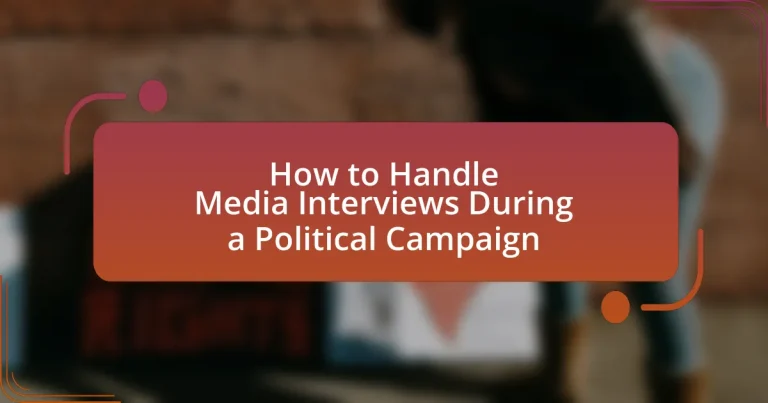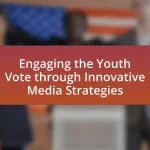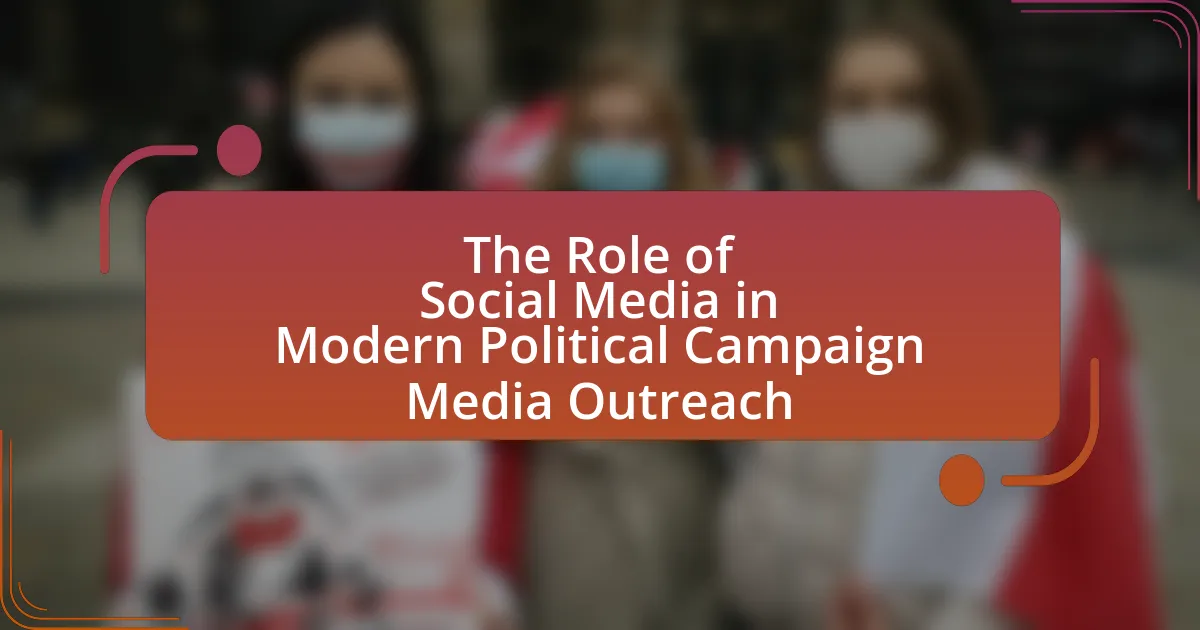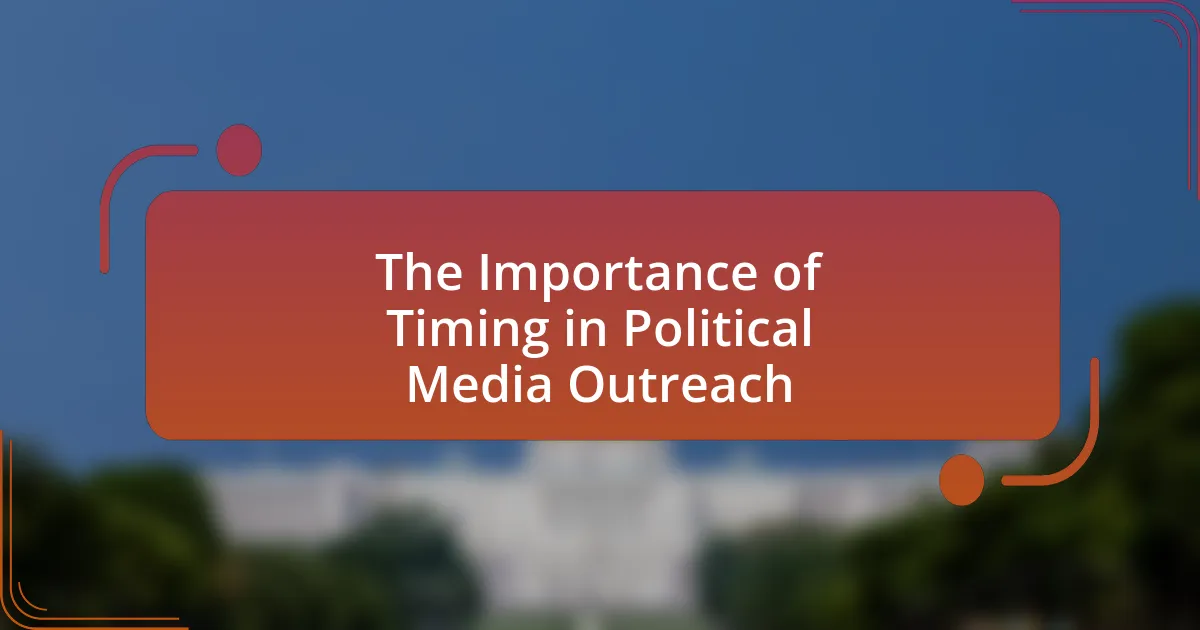The article focuses on the essential strategies for candidates to effectively handle media interviews during political campaigns. Key considerations include thorough preparation, clarity of message, and awareness of the audience. Candidates are advised to research media outlets, practice responses to potential questions, and utilize concise language to communicate their key points. Additionally, the article highlights the importance of body language, understanding the media landscape, and maintaining a consistent message across various platforms. Techniques for managing tough questions and addressing misinformation are also discussed, emphasizing the impact of effective communication on public perception and voter support.
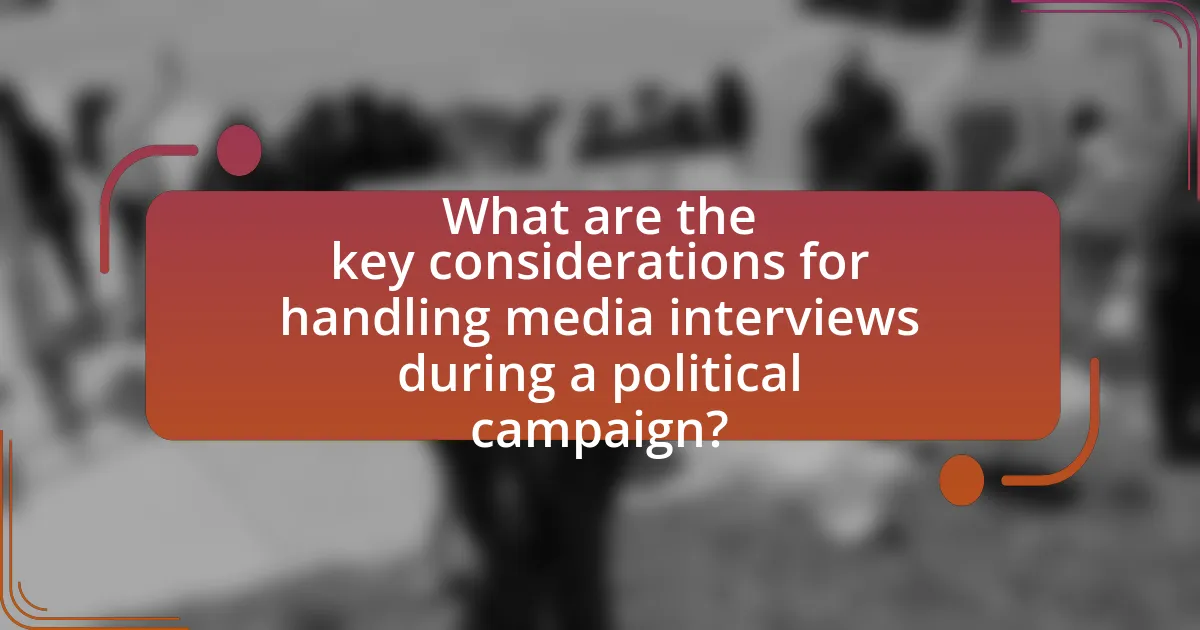
What are the key considerations for handling media interviews during a political campaign?
Key considerations for handling media interviews during a political campaign include preparation, message clarity, and audience awareness. Preparation involves researching the media outlet and understanding the interview format, which helps candidates anticipate questions and formulate responses. Message clarity ensures that candidates communicate their key points effectively, avoiding jargon and focusing on core issues that resonate with voters. Audience awareness requires candidates to tailor their messages to the specific demographics and interests of the audience, enhancing engagement and relatability. These considerations are crucial as they can significantly influence public perception and voter support during the campaign.
How can candidates prepare for media interviews effectively?
Candidates can prepare for media interviews effectively by conducting thorough research on the media outlet, understanding the audience, and practicing key messages. Researching the media outlet helps candidates tailor their responses to align with the outlet’s style and audience preferences. Understanding the audience allows candidates to anticipate questions and concerns that may arise during the interview. Practicing key messages ensures that candidates can communicate their main points clearly and confidently. According to a study by the Pew Research Center, 62% of voters find candidates who are well-prepared and articulate more trustworthy, highlighting the importance of preparation in media interactions.
What research should candidates conduct before an interview?
Candidates should conduct research on the media outlet, the interviewer, and the audience demographics before an interview. Understanding the media outlet’s editorial stance and previous coverage of political issues helps candidates tailor their messages effectively. Researching the interviewer’s background, including their interviewing style and past interviews, allows candidates to anticipate questions and prepare appropriate responses. Additionally, knowing the audience demographics, such as their political leanings and interests, enables candidates to connect their messages to the audience’s values and concerns. This approach is supported by studies indicating that tailored communication increases engagement and effectiveness in political messaging.
How can candidates practice their responses to potential questions?
Candidates can practice their responses to potential questions by conducting mock interviews with peers or professionals. This method allows candidates to simulate real interview scenarios, receive constructive feedback, and refine their messaging. Research indicates that role-playing exercises significantly enhance communication skills and confidence, as they provide a safe environment for candidates to experiment with different responses and strategies.
What strategies can candidates use to convey their message clearly?
Candidates can convey their message clearly by utilizing concise language, focusing on key points, and employing active listening. Concise language ensures that the message is straightforward and easily understood, while focusing on key points helps to emphasize the most important aspects of their platform. Active listening allows candidates to respond effectively to questions and engage with the interviewer, which enhances clarity and connection with the audience. Research indicates that clear communication significantly improves audience retention and understanding, as demonstrated in studies on effective public speaking techniques.
How can candidates develop a concise message for interviews?
Candidates can develop a concise message for interviews by clearly defining their key points and practicing their delivery. This involves identifying the core message they want to communicate, which should align with their campaign goals and resonate with their target audience. Research indicates that messages are most effective when they are simple, memorable, and focused on a few main ideas. For instance, a study by the Pew Research Center found that voters respond better to straightforward messages that can be easily recalled. By rehearsing these key points, candidates can ensure they convey their message effectively within the limited time of an interview.
What role does body language play in media interviews?
Body language plays a crucial role in media interviews by influencing audience perception and conveying confidence or discomfort. Nonverbal cues, such as posture, facial expressions, and gestures, can significantly impact how a message is received; for instance, open body language can enhance credibility, while closed or defensive postures may suggest insecurity. Research indicates that approximately 55% of communication is nonverbal, highlighting the importance of body language in effectively delivering messages during interviews.
Why is it important to understand the media landscape during a campaign?
Understanding the media landscape during a campaign is crucial because it enables effective communication strategies tailored to specific audiences. By analyzing various media channels, candidates can identify which platforms resonate most with their target demographics, ensuring their messages reach the intended voters. For instance, a Pew Research Center study indicates that 53% of U.S. adults get news from social media, highlighting the importance of digital platforms in modern campaigns. This knowledge allows campaigns to allocate resources efficiently, engage with constituents meaningfully, and respond to public sentiment in real-time, ultimately influencing voter perceptions and behaviors.
What types of media outlets should candidates focus on?
Candidates should focus on local news outlets, digital media platforms, and social media channels. Local news outlets provide targeted coverage and can influence community opinions, while digital media platforms, such as online news websites and blogs, allow for broader reach and engagement. Social media channels enable direct interaction with voters, facilitating real-time communication and feedback. According to a Pew Research Center study, 53% of Americans get their news from social media, highlighting its importance in modern political campaigns.
How can candidates tailor their message for different media formats?
Candidates can tailor their message for different media formats by adjusting the content, tone, and delivery style to suit each platform’s audience and characteristics. For instance, in television interviews, candidates should focus on concise, impactful statements and visual presence, while in print media, they can provide more detailed explanations and nuanced arguments. Social media requires brevity and engagement, often using informal language and visuals to capture attention quickly. Research shows that messages tailored to specific formats increase audience engagement and retention, as evidenced by a study from the Pew Research Center, which found that 64% of social media users prefer concise messages that are easy to share.
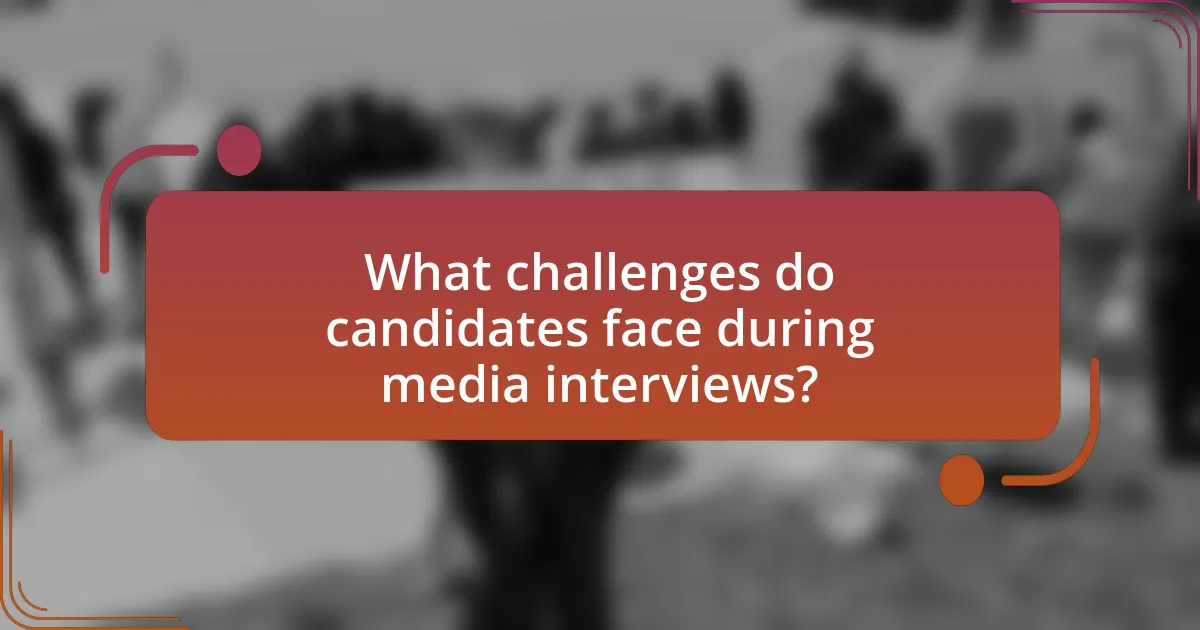
What challenges do candidates face during media interviews?
Candidates face several challenges during media interviews, including managing public perception, responding to tough questions, and maintaining composure under pressure. Public perception can be influenced by the candidate’s ability to articulate their message clearly and connect with the audience, which is crucial in a political campaign. Tough questions often arise regarding controversial topics or past actions, requiring candidates to prepare well-researched responses to avoid missteps. Additionally, maintaining composure is vital, as nervousness or defensiveness can lead to negative portrayals in the media. These challenges are supported by studies indicating that effective communication and emotional control significantly impact a candidate’s media performance and public image.
How can candidates handle tough questions from journalists?
Candidates can handle tough questions from journalists by preparing thoroughly and maintaining composure. Preparation involves understanding potential questions and formulating clear, concise responses that align with their campaign messages. Composure is crucial; candidates should remain calm, listen actively, and respond thoughtfully, which helps to convey confidence and credibility. Research indicates that candidates who practice mock interviews and receive media training are better equipped to navigate challenging questions effectively, as they can anticipate difficult topics and articulate their positions clearly.
What techniques can be used to deflect negative questions?
Techniques to deflect negative questions include reframing, pivoting, and using bridging statements. Reframing involves changing the context of the question to focus on a more positive aspect, thereby shifting the narrative. For example, if asked about a controversial policy, a candidate might highlight the benefits of their overall platform instead. Pivoting allows the speaker to redirect the conversation to a topic they prefer, such as discussing their achievements or future plans. Bridging statements serve as a transition, acknowledging the question briefly before steering the discussion toward a more favorable subject. These techniques are effective in maintaining control of the interview and presenting a positive image, as demonstrated by successful political figures who often employ them during challenging media interactions.
How should candidates respond to misleading or inaccurate information?
Candidates should respond to misleading or inaccurate information by promptly addressing the inaccuracies with clear, factual corrections. This approach helps to maintain credibility and informs the public about the truth. For instance, if a candidate is misquoted or misrepresented, they should issue a statement or use social media to clarify the facts, providing evidence or sources to support their claims. Research indicates that timely and transparent communication can significantly mitigate the impact of misinformation, as seen in studies conducted by the Pew Research Center, which highlight the importance of fact-checking in political discourse.
What are the risks of miscommunication during interviews?
Miscommunication during interviews poses significant risks, including the potential for misinterpretation of key messages, which can lead to public confusion or negative perceptions. For instance, if a candidate’s stance on an issue is not clearly articulated, it may be reported inaccurately, resulting in a misrepresentation of their views. Additionally, miscommunication can damage the candidate’s credibility, as inconsistent messaging may lead voters to question their reliability. Research indicates that 70% of communication is non-verbal, meaning that body language and tone can also contribute to misunderstandings, further complicating the interview process. Ultimately, these risks can adversely affect a political campaign’s effectiveness and public image.
How can candidates avoid common pitfalls in media interviews?
Candidates can avoid common pitfalls in media interviews by thoroughly preparing for potential questions and practicing clear, concise messaging. Preparation involves researching the media outlet, understanding the audience, and anticipating challenging questions, which helps candidates respond confidently and stay on message. Practicing with mock interviews can also enhance delivery and reduce anxiety. Additionally, candidates should remain calm, avoid jargon, and focus on key points to ensure their message is effectively communicated. Studies show that well-prepared candidates are more likely to convey their messages successfully and engage positively with the audience.
What impact can a poor interview have on a campaign?
A poor interview can significantly damage a campaign by undermining the candidate’s credibility and public perception. When candidates fail to articulate their positions clearly or respond effectively to questions, it can lead to misinterpretations and negative media coverage. For instance, a study by the Pew Research Center found that 63% of voters are influenced by how candidates perform in interviews, indicating that poor performance can directly affect voter opinions and support. Additionally, a poorly handled interview can result in viral soundbites that detract from the campaign’s message, further complicating the candidate’s ability to connect with the electorate.
How can candidates manage their image during media interactions?
Candidates can manage their image during media interactions by preparing key messages and practicing effective communication techniques. Preparation involves identifying core messages that align with their campaign goals and rehearsing responses to potential questions, which helps maintain focus and clarity during interviews. Effective communication techniques include active listening, maintaining eye contact, and using confident body language, which can enhance the candidate’s credibility and relatability. Research indicates that candidates who engage in media training are better equipped to handle challenging questions and present themselves positively, ultimately influencing public perception and voter support.
What role does social media play in shaping public perception?
Social media significantly influences public perception by providing a platform for rapid information dissemination and engagement. It allows individuals and organizations to share opinions, news, and narratives that can shape how events and figures are viewed. For instance, a Pew Research Center study found that 69% of adults in the U.S. use social media, making it a critical space for shaping political discourse and public opinion. The immediacy and reach of social media enable users to amplify messages, often leading to viral trends that can alter perceptions almost instantaneously.
How can candidates ensure consistency in their messaging across platforms?
Candidates can ensure consistency in their messaging across platforms by developing a clear and concise messaging framework that outlines key themes and talking points. This framework should be utilized in all communications, including social media, interviews, and public appearances, to maintain a unified voice. Research indicates that consistent messaging can enhance brand recognition and trust; for instance, a study by the Journal of Marketing found that consistent messaging across channels can increase consumer trust by up to 30%. By adhering to this framework and regularly training campaign staff on its application, candidates can effectively present a cohesive narrative to their audience.
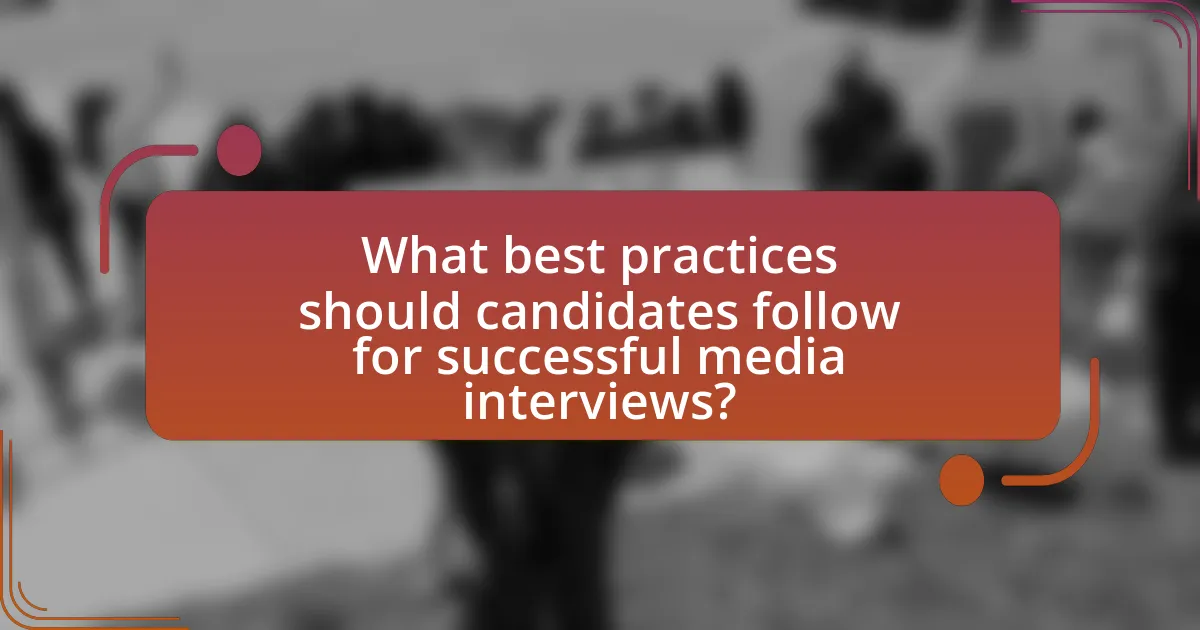
What best practices should candidates follow for successful media interviews?
Candidates should prepare thoroughly for media interviews by researching the media outlet, understanding the audience, and formulating key messages. Preparation ensures candidates can effectively communicate their platform and respond to questions confidently. Additionally, practicing answers to potential questions helps candidates articulate their points clearly and stay on message. According to a study by the Pew Research Center, candidates who engage in media training are more likely to convey their messages effectively and connect with voters. This preparation not only enhances their performance but also builds credibility with the audience.
How can candidates build rapport with journalists?
Candidates can build rapport with journalists by establishing open communication and demonstrating respect for their work. Engaging journalists through regular updates, being accessible for questions, and providing timely information fosters a positive relationship. Additionally, candidates should understand journalists’ deadlines and preferences, which can enhance mutual respect. Research indicates that candidates who maintain consistent and transparent communication with media professionals are more likely to receive favorable coverage, as noted in studies on media relations in political campaigns.
What are effective ways to establish a positive relationship with the media?
Effective ways to establish a positive relationship with the media include consistent communication, transparency, and providing timely information. Consistent communication fosters trust, as journalists appreciate regular updates and access to key campaign figures. Transparency in sharing campaign goals and challenges helps build credibility, while timely information ensures that media outlets can report accurately and promptly. According to a study by the Pew Research Center, 70% of journalists value access to reliable sources, highlighting the importance of maintaining open lines of communication.
How can candidates show appreciation for media coverage?
Candidates can show appreciation for media coverage by publicly thanking journalists and media outlets for their coverage. This acknowledgment can enhance relationships with the media, fostering goodwill and encouraging future positive coverage. For instance, candidates can express gratitude through social media posts, press releases, or during public speeches, highlighting specific articles or segments that positively impacted their campaign. Research indicates that positive media relations can lead to increased visibility and support, as seen in campaigns where candidates actively engage with the press, resulting in a more favorable public perception.
What techniques can enhance a candidate’s performance during interviews?
Techniques that can enhance a candidate’s performance during interviews include thorough preparation, effective communication, and active listening. Thorough preparation involves researching the media outlet, understanding the audience, and anticipating potential questions, which can lead to more confident and informed responses. Effective communication entails articulating key messages clearly and concisely, using appropriate body language, and maintaining eye contact, which helps in engaging the interviewer and audience. Active listening allows candidates to respond thoughtfully to questions and adapt their answers based on the interviewer’s cues, fostering a more dynamic interaction. These techniques are supported by studies indicating that well-prepared candidates tend to perform better in interviews, as they can convey their messages more effectively and connect with their audience.
How can candidates use storytelling to engage their audience?
Candidates can use storytelling to engage their audience by sharing personal anecdotes that resonate emotionally and illustrate their values and vision. This approach allows candidates to create a connection with their audience, making complex political issues more relatable and understandable. For instance, a candidate might recount a personal experience that highlights their commitment to healthcare reform, thereby humanizing their policy stance and fostering empathy. Research shows that narratives can significantly enhance message retention and persuasion, as evidenced by a study published in the journal “Psychological Science,” which found that stories are more effective than statistics in influencing opinions and behaviors.
What are the benefits of using statistics and facts in interviews?
Using statistics and facts in interviews enhances credibility and supports arguments effectively. When candidates present data, such as polling numbers or economic statistics, they provide concrete evidence that can persuade the audience and journalists. For instance, a candidate discussing a 10% unemployment rate can substantiate their claims about economic policies, making their statements more compelling. Research indicates that factual information increases trustworthiness; a study by the Pew Research Center found that 63% of voters are more likely to trust candidates who use data to back their claims. Thus, incorporating statistics and facts not only strengthens the message but also fosters a more informed dialogue during political interviews.
What practical tips can candidates implement for media interview success?
Candidates can implement several practical tips for media interview success, including thorough preparation, clear messaging, and effective body language. Thorough preparation involves researching the media outlet, understanding the audience, and anticipating potential questions, which enhances confidence and control during the interview. Clear messaging ensures that candidates articulate their key points succinctly, making it easier for the audience to grasp their positions. Effective body language, such as maintaining eye contact and using appropriate gestures, reinforces the candidate’s message and engages the audience. These strategies are supported by studies indicating that well-prepared candidates are perceived as more credible and trustworthy, which is crucial in a political campaign context.
How can candidates prepare a media kit for interviews?
Candidates can prepare a media kit for interviews by compiling essential materials that showcase their campaign, including a biography, key messages, press releases, and high-resolution images. This media kit should be organized and easily accessible, allowing journalists to quickly find relevant information. Including statistics about the candidate’s platform and past achievements can enhance credibility and provide context for the media. Additionally, providing contact information for the campaign’s press representative ensures that journalists can reach out for further inquiries.
What are the key takeaways for candidates to remember during interviews?
Candidates should remember to communicate clearly, stay on message, and engage with the audience during interviews. Clear communication ensures that the candidate’s points are understood, while staying on message helps maintain focus on key campaign themes. Engaging with the audience fosters a connection that can enhance relatability and support. Research indicates that effective communication strategies can significantly influence public perception, as seen in various political campaigns where candidates who articulated their messages clearly garnered higher approval ratings.
